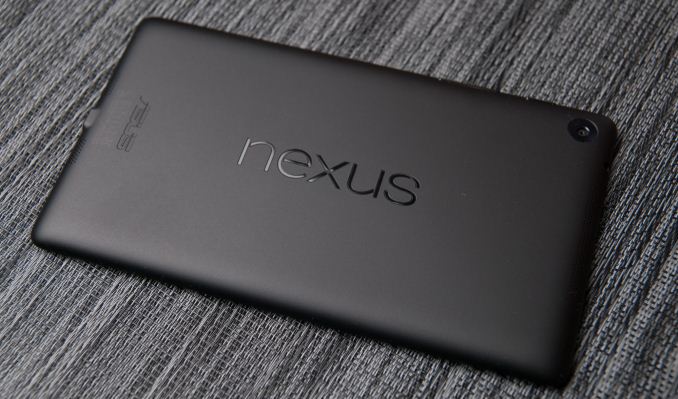Nexus 7 (2013) - Mini Review
by Brian Klug on July 27, 2013 12:54 AM EST- Posted in
- Tablets
- Snapdragon
- Qualcomm
- Android
- Mobile
- APQ8064
- Nexus 7
- Android 4.3
I hesitate to do quick turnaround reviews of products, that’s why this is a short review and Anand is hopefully going to take a longer look at the Nexus 7 (2013). From the time that I’ve spent with the new Nexus 7 however, I think it’s safe at this point to deem it more than a worthy successor to the tablet that not only dominated its form factor for its entire run, but proved that 7-inches was probably the right size for Android tablets. The display is excellent, and at present the best in its 7–8 inch class, beating even the iPad mini in terms of GMB Delta-E 2000 and resolution. Performance is great, build quality is great, and the whole affair runs stock, unadulterated Android 4.3.
The new Nexus 7 is everything a generational refresh should be – performance goes up dramatically, issues were fixed (storage), features were added (5 GHz WiFi, rear facing camera, Qi charging, high DPI display), and it’s all in a thinner and lighter form factor. Everything about the OG Nexus 7 is better in the 2013 model, all while keeping basically the same price point, and we haven’t even looked at the 4G LTE enabled version yet which adds the right kind of operator-agnostic LTE bands for two regions that I’ve been begging for. It’s undeniable that Google is doing something right with the Nexus program, and along with it, hardware partner ASUS.











252 Comments
View All Comments
psyside1 - Sunday, July 28, 2013 - link
Did you even read the article from the link? also Brian already confirmed that 32GB will be faster.Death666Angel - Monday, July 29, 2013 - link
Well, he didn't reply to an eMMC based comment, the comment he replied to specifically talks about SSDs. No idea why you bring HDDs into this either, you are replying to nothing I said.Death666Angel - Monday, July 29, 2013 - link
Your comment was in reply to SSDs (and USB drives), not eMMC controllers, so I maintain that you are incorrect in this paragraph:"They might, but I doubt it has anything to do with the size, and more with the manufacturer's "strategy" of making higher store that is more expensive, also have higher speed."
phillyry - Tuesday, July 30, 2013 - link
His initial question was about the 32GB model vs. the 16GB one, so it was about eMMC.His source, written by Anand about last year's Nexus 7s, supports that his question is valid.
So, Brian, do we get the details on any noted differences in I/O performance between the two models?
phillyry - Wednesday, July 31, 2013 - link
Anand replied to my tweet clarifying that he has a 16GB to review but that he can't of confirm that there will not be multiple controllers, which could affect storage speed:@phillyry @nerdtalker yep I've got a 16GB model here, I don't know how many places ASUS sources eMMC from though. That could matter as well
phillyry - Wednesday, July 31, 2013 - link
My question was:@nerdtalker @anandshimpi are we going to get the I/O performance numbers for both #Nexus7 models in the full #anandtech review?
lightsout565 - Saturday, July 27, 2013 - link
At least with SSD's, larger models benefit from increase write speeds. I'm not sure if you'd notice a difference in 16 vs 32GB models though. I'll wait till a more informed person responds hahaEgg - Saturday, July 27, 2013 - link
Brian Klug said on twitter that he was sampled the 32 GB version.With regards to performance, https://twitter.com/nerdtalker/status/361201767733...
More flash is faster. Please do your research before making bogus claims.
eio - Sunday, July 28, 2013 - link
waiting for a storage performance comparison between 16G/32G models...will AnandTech be the first to do this?psyside1 - Sunday, July 28, 2013 - link
Me to bro, i already suggest this :)